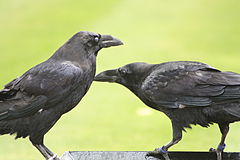Here is an old poem that I've liked for a very long time. I've referred to it on The Everyday Adventurer more than a few times over the years. I don't know why I didn't think of this dark poem about two ravens for this nature poetry feature until now. I've featured two versions so it an be understood by all.
This is an old Scottish poem. I'm not sure if the original author is known anymore. There is an English version called "The Three Ravens, but they are a little different, especially because there are a different number of ravens. Let's get to the poem.
Now let's read the poem in modern English. It's a bit easier to understand. Personally, I like the original version more.
This is an old Scottish poem. I'm not sure if the original author is known anymore. There is an English version called "The Three Ravens, but they are a little different, especially because there are a different number of ravens. Let's get to the poem.
The Twa Corbies
As I was walking all alane,
I heard twa corbies makin a mane;
The tane unto the ither say,
"Whar sall we gang and dine the-day?"
"In ahint yon auld fail dyke,
I wot there lies a new slain knight;
And nane do ken that he lies there,
But his hawk, his hound an his lady fair."
"His hound is tae the huntin gane,
His hawk tae fetch the wild-fowl hame,
His lady's tain anither mate,
So we may mak oor dinner swate."
"Ye'll sit on his white hause-bane,
And I'll pike oot his bonny blue een;
Wi ae lock o his gowden hair
We'll theek oor nest whan it grows bare."
"Mony a one for him makes mane,
But nane sall ken whar he is gane;
Oer his white banes, whan they are bare,
The wind sall blaw for evermair."
Now let's read the poem in modern English. It's a bit easier to understand. Personally, I like the original version more.
The Two Ravens
As I was walking all alone,
I heard two ravens making a moan;
One said to the other,
"Where shall we go and dine today?"
"In behind that old turf wall,
I sense there lies a newly slain knight;
And nobody knows that he lies there,
But his hawk, his hound and his lady fair."
"His hound is to the hunting gone,
His hawk to fetch the wild-fowl home,
His lady's has taken another mate,
So we may make our dinner sweet."
"You will sit on his white neck-bone,
And I'll peck out his pretty blue eyes;
With one lock of his golden hair
We'll thatch our nest when it grows bare."
"Many a one for him is moaning,
But nobody will know where he is gone;
Over his white bones, when they are bare,
The wind will blow for evermore."

Aye Mon, ye canna haud a candle tae the original, ye ken.
ReplyDeleteI like the first version as well. It sounds like two crossed lovers during the Middle Ages or an admirer.
ReplyDelete@Don't unplug your hub
ReplyDeleteExcellent! It would be a real treat to be able to hear you read the poem like that.
-
@Lauren Axelrod
Yeah, the original gives the poem that special something that makes it so good.